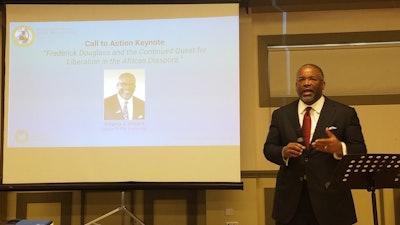DUBLIN—Although Frederick Douglass has emerged as a prominent figure in United States history, many are unaware that the former slave who would go on to become a staunch abolitionist, orator and author, spent several months in Ireland proclaiming that his time here produced “some of the happiest moments of [his] life.”
Born in 1818, this year the world is celebrating the bicentennial birthday of Douglass who has become one of the most recognized and important Black leaders in history. And that celebration was also the focus of the 7th annual International Colloquium on Black Males in Education, where Douglass’ life and work was critically examined by Dr. Gregory J. Vincent, who is the CEO and Chairman of Sigma Pi Phi, also known as the Boulé. 
The international fraternity founded in Philadelphia in 1904 was a co-sponsor of this year’s colloquium that brought scholars and practitioners who study and work with Black males to Ireland for a four-day convening.
“Given some of our weaker Black history, one person we did learn about was Frederick Douglass,” said Vincent who delivered the keynote address at the colloquium on Friday. “He is someone who we know. And why? Because for me he sets both the moral tone, but also was the precursor for so much of the work that we even do today.”
Vincent said that like Douglass, those who care about social justice and the plight of young Black males have to talk “plainly and clearly” about the issues that impact this demographic, adding that “the only way we’re going to have a laser focus on the issues at hand, we have to not sugar coat who and what we are.”
Douglass started his life, not as a free person but as a slave, said Vincent, adding that “he did not have any rights in the Dred Scott decision that any White person had to respect. He was chattel.”
As such, he broke the law when he ran away and was subject to fugitive slave laws that sought to return him to his master.
“The reason why he goes to Ireland and England is to get away from that legal law,” said Vincent, a legal scholar and former college president, adding that some of the most egregious acts in human history have been sanctioned by the law.
“Every act that occurred during the Holocaust was attached to a legal regime. Chattel slavery was legal. State sponsored segregation was legal,” he told a packed ballroom. “We celebrate Rosa Parks and Dr. King but they also broke the law. So we have to be very careful about what’s legal and what’s just.”
Vincent said that Douglass understood that he was a moral compass and acted accordingly.
“He understood the shared humanity and opportunities and struggles of people that looked like him, but also people who did not look like him,” Vincent said. “He connected with those persons in Ireland who were just beginning to suffer from the famines. He understood their shared struggles and made the connections between Irish farmers who was living in what he called ‘mud huts’ and his own brothers and sisters who lived in chattel slavery back in the United States. He understood the shared humanity and the shared struggle.”
Douglass, Vincent said, also understood the global context and was deeply concerned about problems across the world and was a feminist who championed women’s rights.
“What made Frederick Douglass so compelling was that he kept it plain. He talked about the need for racial justice for Black men and Black women while also advocating for the rights of women even when some of the leaders of the Women’s Rights Movement turned on the quest for racial justice,” Vincent said. “He never waivered from that. He knew what was right, even when he called out the hypocrisy.”
Douglass was also a fierce advocate for education. And even though he was self-taught, “he understood the institution of education” and created a model that other civil rights advocate like Thurgood Marshall and Charles Hamilton Houston would later emulate when they laid the legal groundwork for Brown vs. Board of Education.
“They chose education because they understood that if you fought for education, that if you were an educated person, you had a passport to a better life,” he said.
At the closing banquet, Don Mullen, the founder of the Frederick Douglass Ireland Project which educates the public about Douglass’ time in Ireland and the connection between Irish leaders like Daniel O’Connell who was also dedicated to the abolition of slavery, delivered a rousing speech.
Colloquium Co-chairs Drs. Jerlando F. L. Jackson and James L. Moore III, presented Warrior Awards to Drs. Lemuel W. Watson, Dean and Provost Professor of the Indiana University School of Education; Livingston Thompson, a member of the Irish Institute of Training and Development; William H. Smith, founder and executive director for the National Center for Race Amity and Dr. Chance W. Lewis, the Carol Grotnes Bell Distinguished Professor of Education at the University of North Carolina at Charlotte.
“The Warrior Award is a highly-coveted, international honor and distinction given to both men and women who possess an outstanding record of service and leadership on the most difficult challenges impacting Black males in education,” said Jackson, adding that the individuals selected “exhibit exceptional characteristics of strength, courage, and determination and use their social status, position, knowledge, and/or resources to advance significant social justice causes.”
Jamal Watson can be reached at jwatson1@diverseeducation. You can follow him on Twitter @jamalericwatson
















